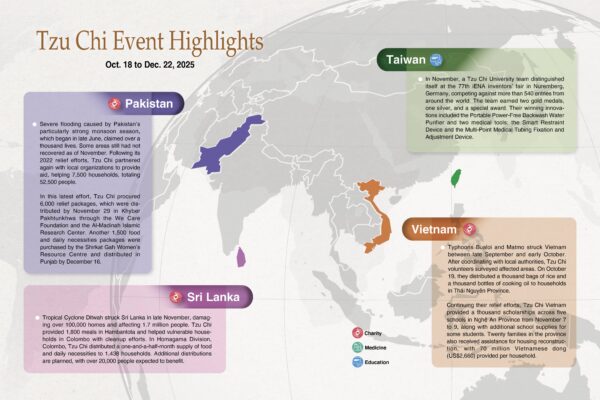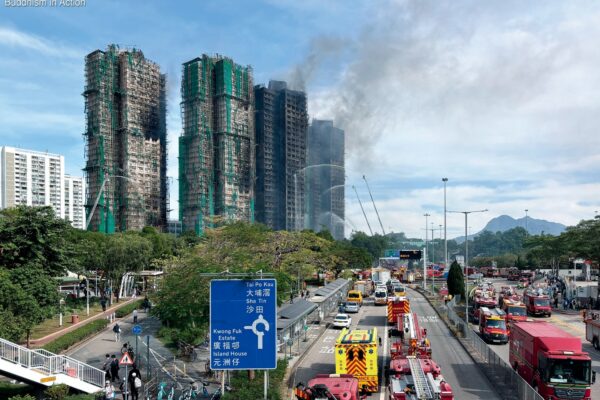By Yap Chai Hoon
Translated by Rose Ting
Photos by Sam Pin Fook
Where does the solution to the refugee problem lie? Perhaps it is as close as the human heart.
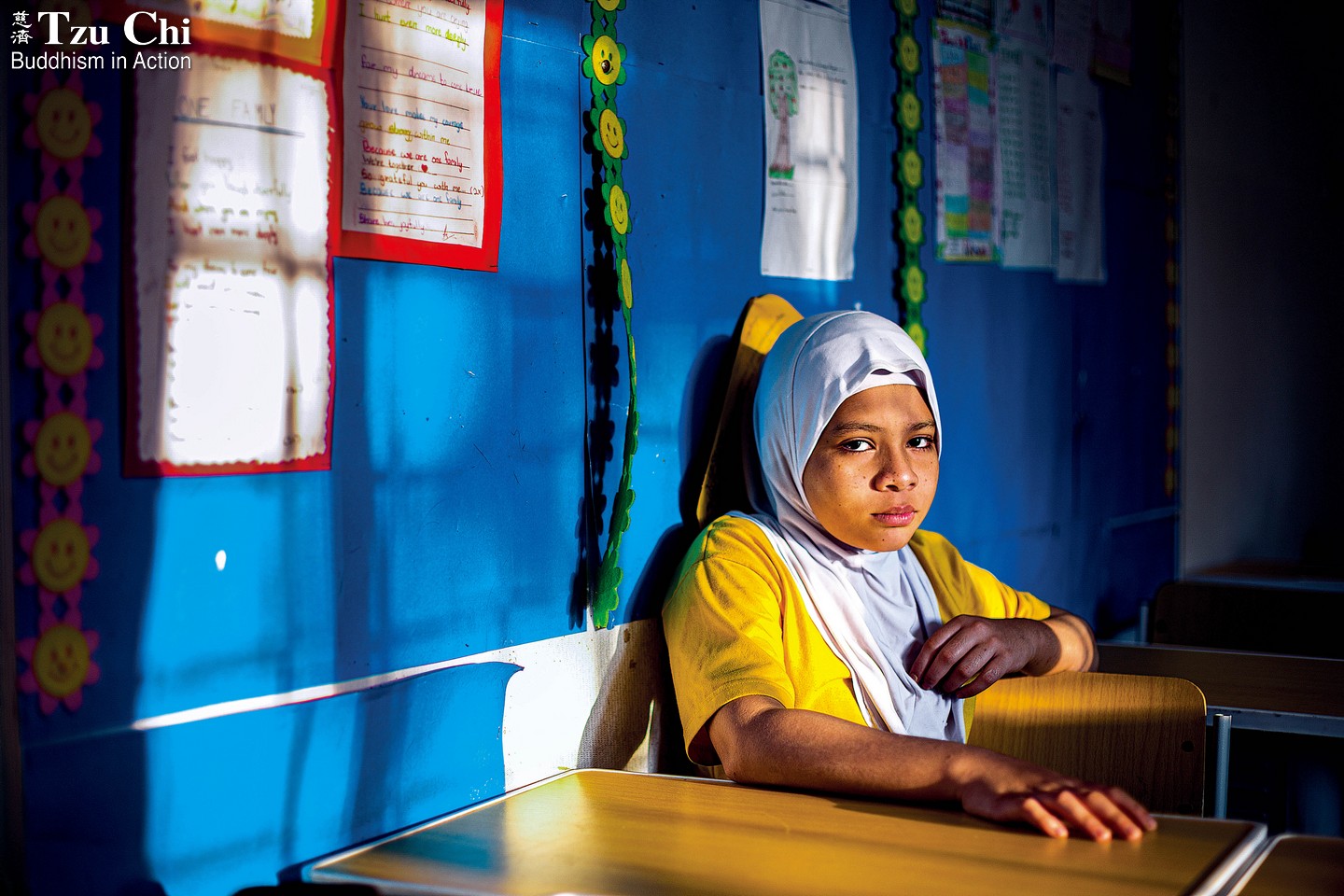
According to statistics from the UNHCR, Malaysia currently hosts more than 45,000 refugees under 18. Though most of them are unable to attend school, Tzu Chi and the UNHCR jointly run two schools to help serve the educational needs of some of these young persons. Sam Pin Fook
It is a scene replicated countless times every day the world over: while a teacher works hard to deliver a lesson in the front of a classroom, a student sits in the back and listens carefully to keep up with the notes. But this wasn’t an ordinary school, nor was the student an ordinary pupil.
The school was the Tzu-Chi Unity Alternative Learning Centre in Kuala Lumpur, Malaysia. It was established by Tzu Chi and the United Nations High Commissioner for Refugees (UNHCR) and offers refugees lessons in English, Malay, math, science, and other subjects. The student was Onaisah Mohamad Harun, a refugee who had been attending the school for four years. It was her dream to one day become a medical doctor, but it was a distant dream at best. Both her father and younger sister were sick, and they couldn’t afford the medical bills. Instead of being able to go to medical school, it was more likely she might have to stop attending school altogether.
Her father’s instructions
The Rakhine and Rohingya peoples in Myanmar have been at odds for nearly a hundred years due to a number of historical, political, racial, and geographical reasons. This has led to a massive exodus of Rohingyas from the country. More than a million Rohingyas have escaped from Myanmar since August 2017, fleeing brutal persecution. Most of them—90 percent—have ended up in refugee camps in Bangladesh. The others have sought refuge in Southeast Asian countries. Malaysia has been one of the preferred destinations for Rohingyas because of a shared belief in Islamic teachings.
Over 180,000 people are currently registered as refugees or asylum seekers in Malaysia. Among those, 150,000 are from Myanmar, including Rohingyas and Chins. “Dad said our hometown [in Myanmar] wasn’t safe to live in,” Onaisah recalled, “so we fled to Malaysia. It was like in a movie. The police wouldn’t let us go ashore. Mom said my younger sister was suffering from a high fever at the time, but we couldn’t even take her to the doctor.”
Onaisah’s father, Mohamad Harun Mohamad Hussein, explained: “Our house in our hometown [in Myanmar] was set on fire, and we couldn’t find a place to pray. Life was tough. I took my family and escaped to Malaysia, but I had only enough money to pay the deposit to travel to the country. I began paying off the rest after I found a job in Malaysia.”
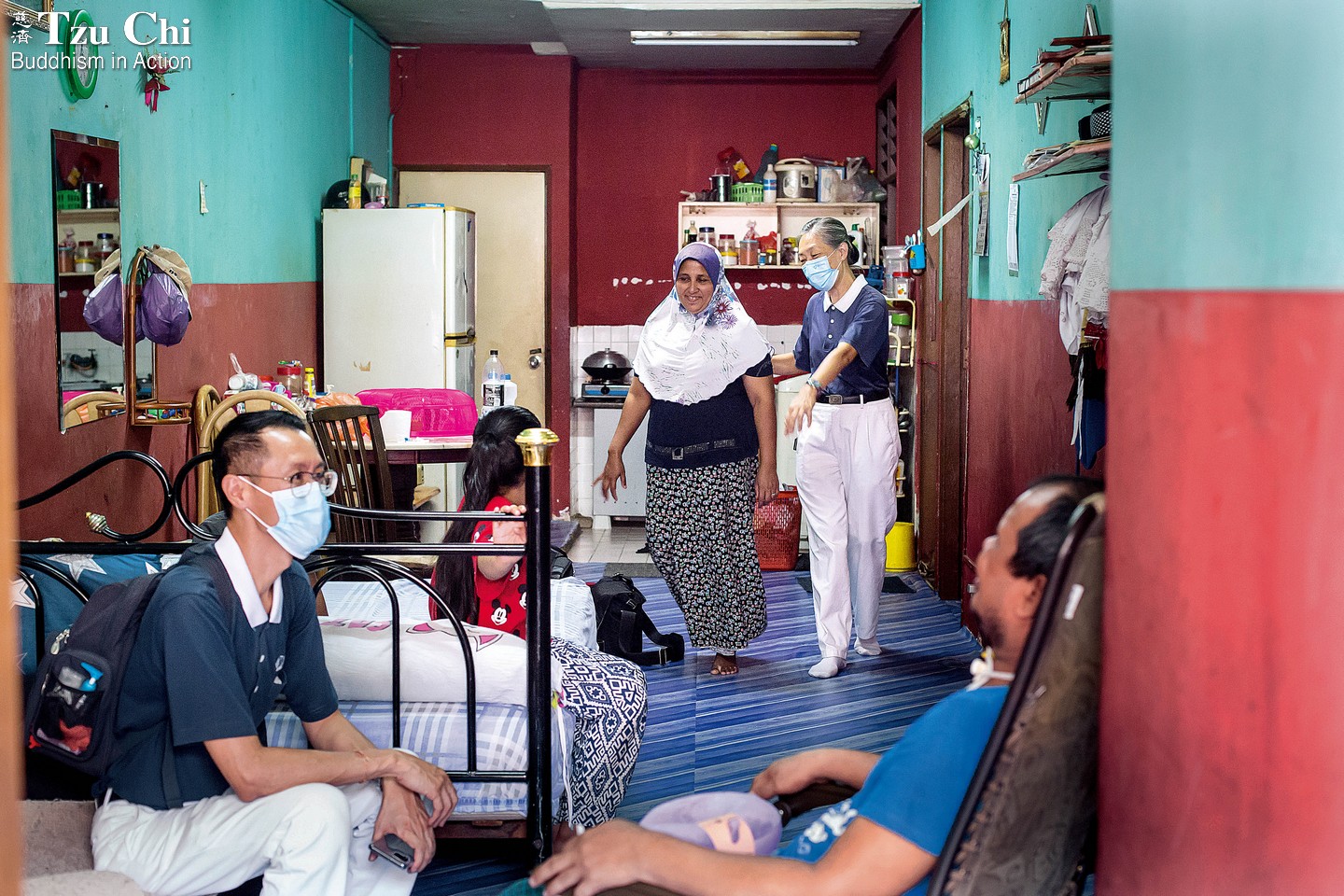
Harun and his family look forward to Tzu Chi volunteers’ visit every month. Harun seems to forget his tribulations in life while chatting with the volunteers.
Life eventually settled down for the family, and they even welcomed a new member into their fold—a baby boy. Sadly, the good times didn’t last. COVID-19 hit in March 2020. To arrest the spread of the virus, the Malaysian government enacted measures to restrict movement. And then Harun lost his job, the only source of income for his family.
After being unable to make the rent for several months, Harun asked the UNHCR for help. Tzu Chi, a partner of the UN agency, arranged for volunteers to assess the family’s situation in August. As a result, the family was granted a monthly subsidy of 700 ringgit (US$162) for half a year. Tzu Chi volunteers also continued to visit the family and arranged for the foundation to pay for the children’s transportation fees to school. When they discovered that Harun was having a health issue, they suggested that he seek medical attention at a Tzu Chi free clinic center in Kuala Lumpur. Harun saw the doctors there, then was referred by the center to Kuala Lumpur Hospital, where he was diagnosed with stage 3 oral cancer.
Harun was able to receive surgery for his cancer with the help of a 10,000 ringgit (US$2,310) subsidy from the UNHCR, but it wasn’t long until he suffered a relapse. The tumor on his face made breathing difficult, nor could he lie flat to sleep. Adding to his tribulations was his worry and concern about his wife and children’s future. With everything he was dealing with, it’s no surprise he often had no appetite and slept poorly.
When the pandemic became so bad that Tzu Chi volunteers couldn’t carry out their regular home visits to the family, volunteers, concerned about Harun’s state of mind, asked a clinical psychologist from the Tzu Chi International Medical Association to extend care to him via videoconferencing. This service greatly helped bring peace to Harun’s mind.
To help Harun sleep better, volunteer Heng Wa Seng (王華成) found a second-hand recliner at a Tzu Chi recycling station and delivered it to him. Tzu Chi also continued to help the family pay the medical bills incurred by Harun and his younger daughter, Sowaibah Mohamad Harun.
Fate has been ruthless to Harun, but fortunately his children have been good and thoughtful. Onaisah and her older brother, Abdul Hamid Mohamad Harun, take turns tending to their father’s needs. Onaisah is a great help to her mother, Halimah Mohamad Yacoob, when it comes to housework. Onaisah has been learning Malay and English at the Tzu Chi learning center, and serves as an interpreter during her father’s hospital visits. Volunteer Michele Ng (黃明珍) is happy to see how fluently Onaisah speaks both languages, and how her confidence has grown.
One day, Onaisah accompanied her father to a follow-up appointment at the hospital. Before they left their home, Harun said something to her that brought her to tears. “Dad told me he probably won’t be able to live long because of his illness, but he also said that we are fortunate to have encountered Tzu Chi and the UNHCR. He said we must never forget their kindness.”
She continued recounting while wiping away her tears: “Though it isn’t his fault that he is sick and unable to work, he feels bad for not being able to give us things we wanted. He is plagued by a sense of guilt.”
Even though Harun is having a hard time in life, he never forgets to remind his children to do good. He told Onaisah that if she ever becomes a doctor, she must tend to the medical needs of underserved people and reach out to those in need.
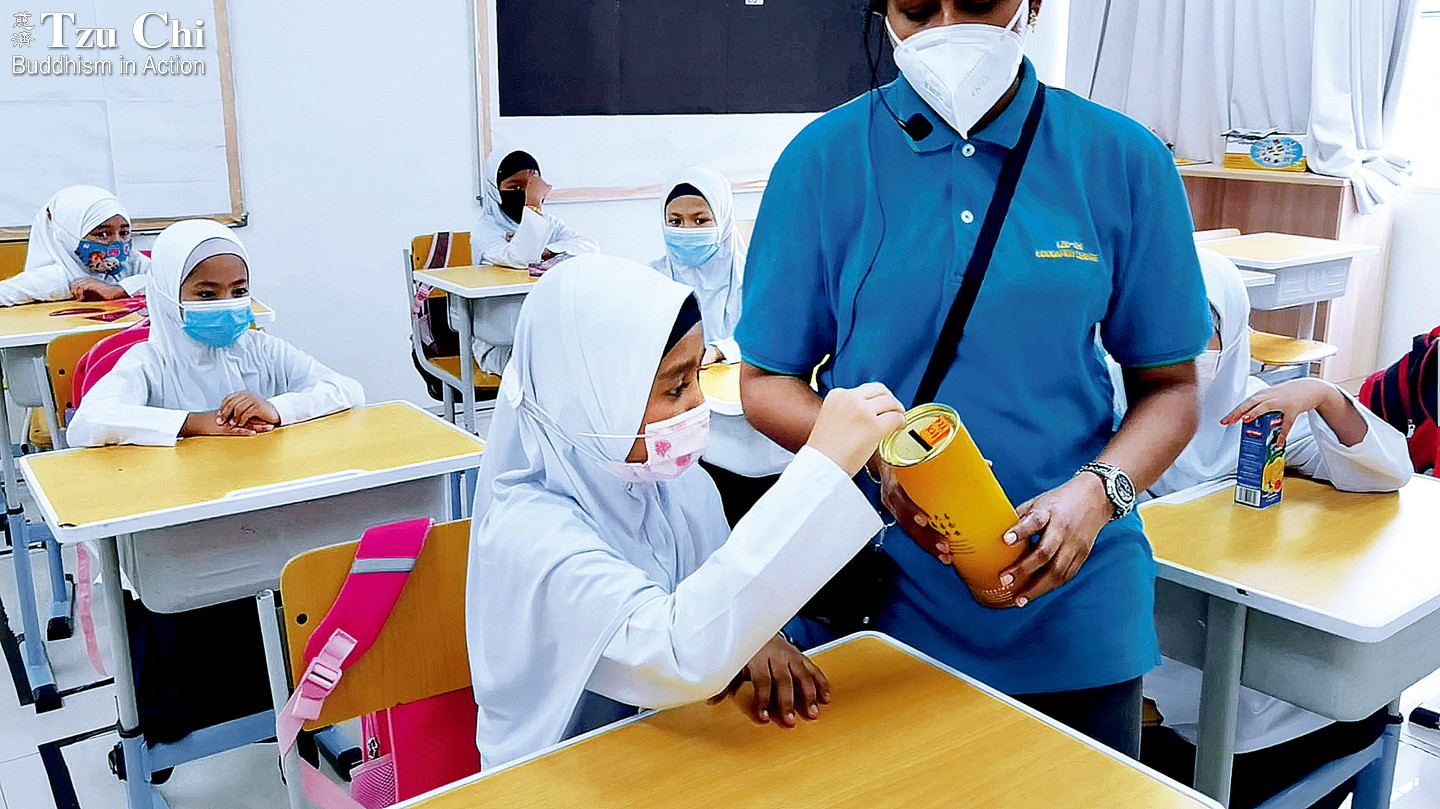
Teachers and students at the two refugee schools run by the UNHCR and Tzu Chi started a donation drive for Ukrainian refugees in March 2022. Liu Jing Xin
Who should refugees turn to for help?
The UNHCR protects the human rights of refugees in Malaysia by providing for their basic needs, such as shelter and food. The UN agency works with non-governmental organizations (NGOs) to meet other needs, such as medical care, education, and protection for women and children. Tzu Chi, for example, has been a longstanding partner of the UNHCR. Their cooperation can be traced back to October 2004, when the two organizations banded together for the first time to hold a free clinic. Since then, Tzu Chi has continuously expanded its scope of aid for refugees.
Echo Chien (簡慈露), CEO of Tzu Chi Kuala Lumpur and Selangor, said that Tzu Chi’s help for refugees is not confined to those areas designated by the UNHCR. The foundation does its best to serve the needs of refugees. “We take on work that is not required by the UNHCR,” said the CEO. Every time a refugee is referred to Tzu Chi for aid, the foundation evaluates their situation to determine whether they are eligible for Tzu Chi’s help. If they are, a case is opened for them, and Tzu Chi provides further assistance to them.
There is no easy fix for the refugee problem. NGOs that serve refugees are constantly faced with all kinds of challenges. MyCARE (Humanitarian Care Malaysia), an organization known for its work for refugees, is no exception. Haji Kamarul Zaman, CEO of MyCARE, believes that they must have the courage of their convictions when it comes to helping refugees. This is especially true, given the different views that exist in Malaysian society regarding the refugees there.
Not everyone welcomes the arrival of refugees, which is not surprising. Still, Kamarul Zaman holds that everyone living on this Earth should extend a helping hand to others in need. Malaysia is not the homeland of Rohingyas. If they could choose, wouldn’t they want to return to the bosom of their homeland? MyCARE empathizes with the plight of such displaced people, regards them as “guests,” and endeavors to be good hosts to them. If the refugees that have come to Malaysia can’t return to their home country in the foreseeable future, efforts must be made to reduce their negative impact on society.
“There is a large number of Rohingyas in Malaysia,” said the MyCARE CEO. “They will do whatever they need to survive. If we can’t help them have better lives here, all kinds of issues will arise. That’s why we extend all humanitarian aid within the limits of our abilities to them.”
MyCARE runs a boarding school in Serdang, Selangor. It has also taken over a religious day school in Kulai, Johor, following a request from the UNHCR. Kamarul Zaman said that his organization devotes a lot of energy to educating refugees. This helps them better integrate into Malaysian society. “If one day these refugees return to their home countries, the training and basic education they receive here will make them better able to help in the development of their homelands. If they never return and keep on living with us in this land, they’ll at least be better equipped to survive.”
MyCARE’s work is not limited to Malaysia. It partners with NGOs in 22 other countries, including Palestine, Iraq, Afghanistan, Pakistan, Nepal, Sri Lanka, Bangladesh, Myanmar, and Vietnam, to provide food, education, healthcare, shelter, and other forms of aid to refugees in those countries.
A concern that some people have about refugees is that they will dilute available social resources. People ask organizations like MyCARE, “Why not save our own people?” To that question, Kamarul Zaman answers that MyCARE, an affiliation of Pertubuhan IKRAM Malaysia (IKRAM), was formed to provide international humanitarian aid. As for needy Malaysian citizens, there is Yayasan Ikram Malaysia: i-Bantu, also an affiliation of IKRAM, to help.
“The Malaysian government has an established system to provide aid to its people,” Kamarul Zaman said. “Take Muslims for example. Each state in the country has a Majlis Agama and a Lembaga Zakat to serve their needs. Non-Muslims can apply for help from the Social Welfare Department. They can even seek assistance from friends, relatives, or charitable organizations. But who can refugees turn to for help? This is what we hope people in our society can understand.”
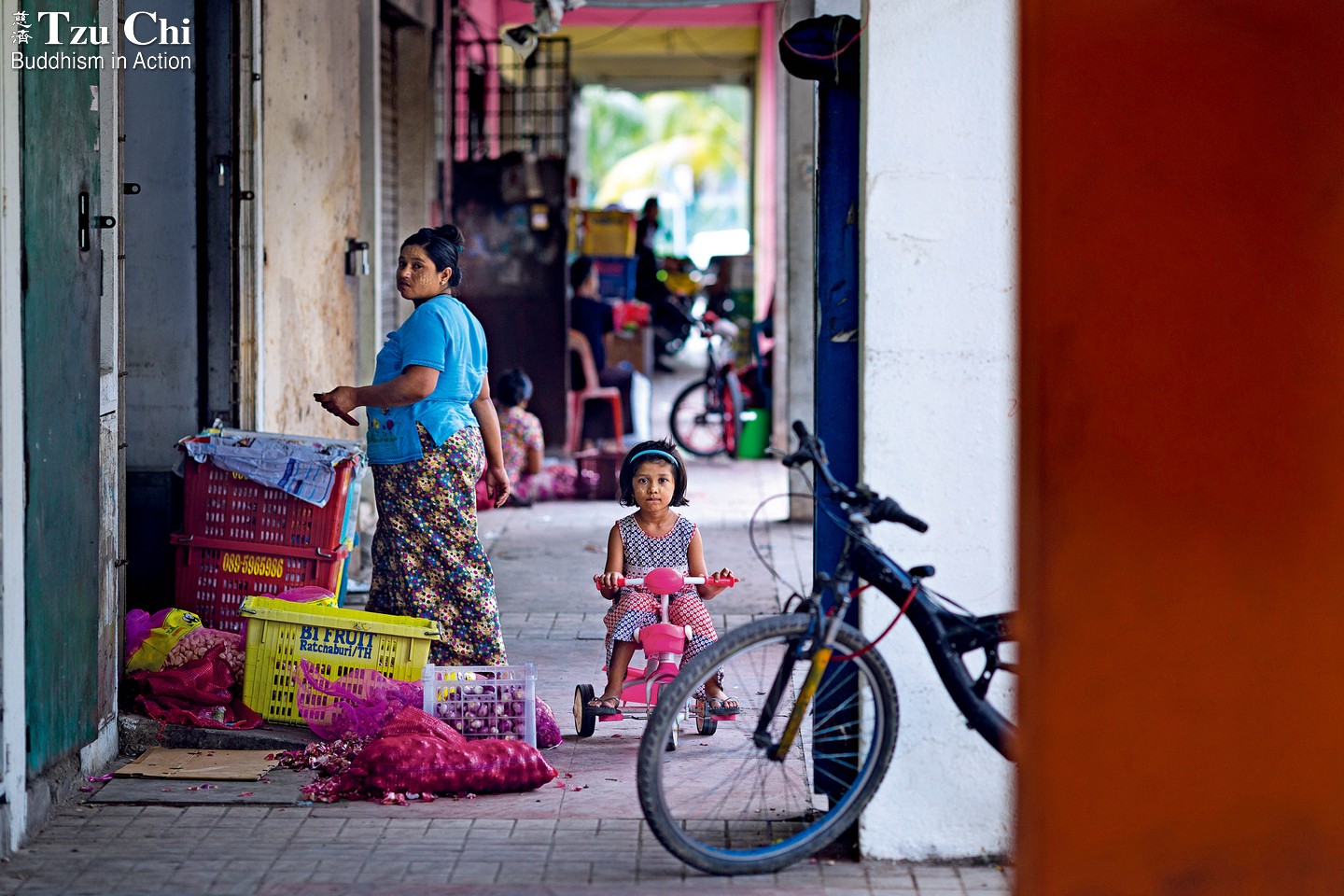
There are over 150,000 refugees from Myanmar in Malaysia. Some families have three generations living together in the country.
The hand that gives the rose
Kamarul Zaman, a devout Muslim, considers helping people in need to be a religious requirement, an obligation. At the same time, he believes that all religions guide people to do good and to live in peace and harmony with others. “As members of humanity,” he said, “what we are doing can perhaps be best summed up in this sentence: ‘The fragrance always stays in the hand that gives the rose.’”
Kamarul Zaman also pointed out an indisputable fact: while people accuse refugees of taking away from available social resources, they are turning a blind eye to the contributions refugees are making to society. “Go take a look at the Selayang wholesale market,” the CEO said, “and see who is doing the work locals don’t want to do.” Refugees have fled their countries to survive, he stressed. “They did not come here to beg, but to seek a chance of survival, through their own efforts if they can. We can at least give them a chance to do so.”
Cox’s Bazar, in Bangladesh, is home to the world’s largest refugee settlement, with nearly a million refugees from Myanmar sheltering there. The living conditions there are overcrowded and far from ideal. Malaysia, by comparison, is like heaven. Many Burmese refugees long to go there. Sadly, many lost their lives on the sea before they could reach their dream destination.
How do we solve the world’s refugee problem? Kamarul Zaman said there is no answer. “Our world continues to produce many refugees. This is a global issue.” He continued, clasping his hands: “At the root of all this is humanity’s greed. People’s hunger for power and profit has given rise to all kinds of problems. If everyone follows the guidance of the religion they believe in and lives in peace with others, peace will reign in our world, and there will be no more refugees.”
With no easy solution to the refugee problem in sight, the existence and work of NGOs provide at least a ray of hope for refugees.
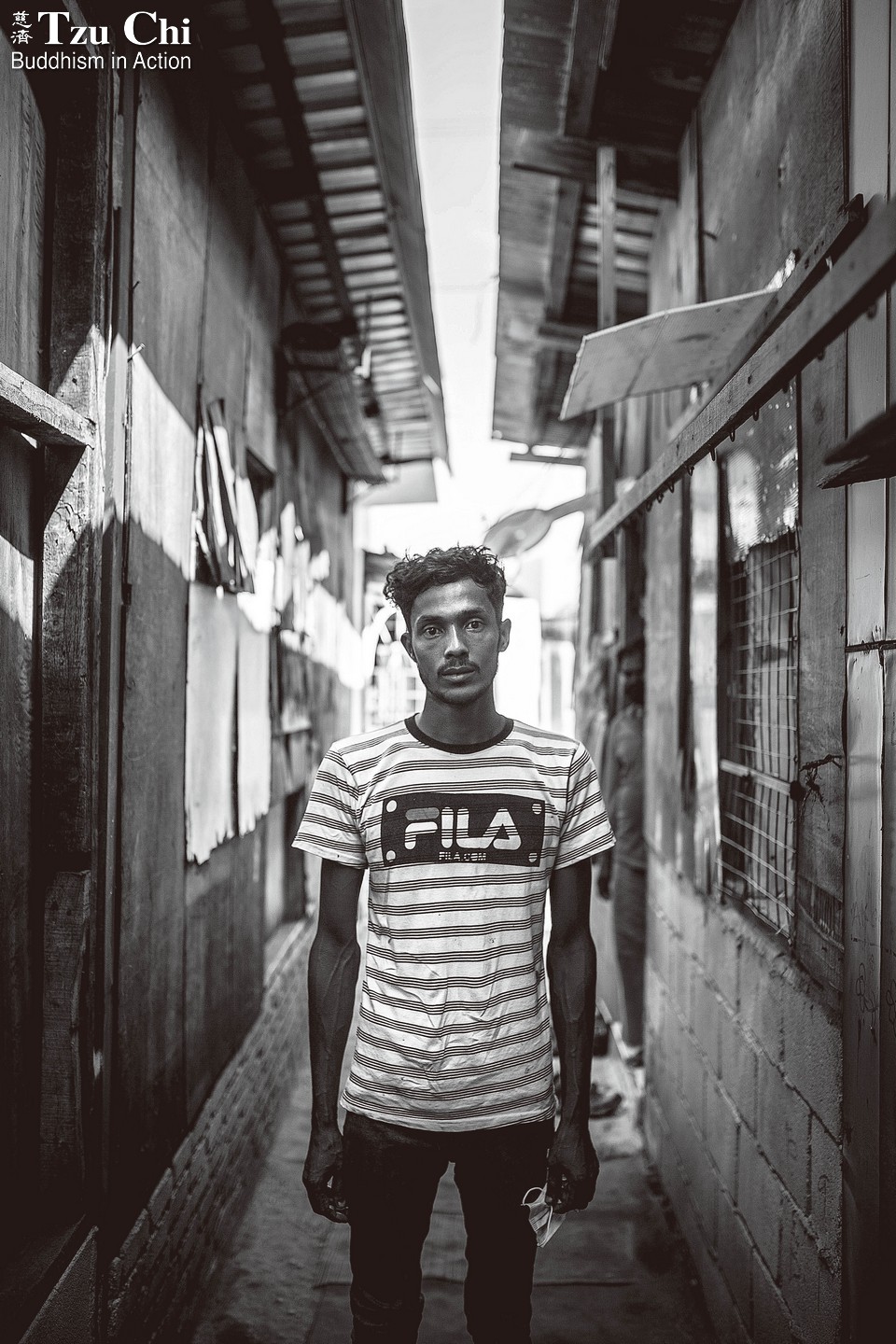
No one wants to leave their own country against their own will. Every refugee deserves help to guard their dignity as a human being.

 Zoom in picture)
Zoom in picture)